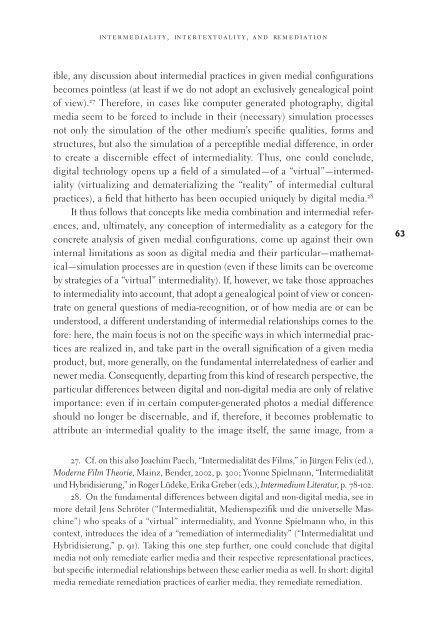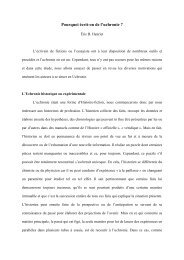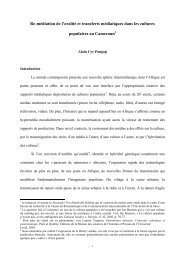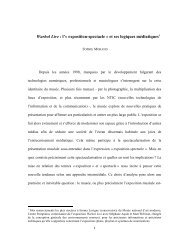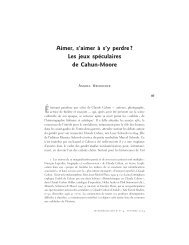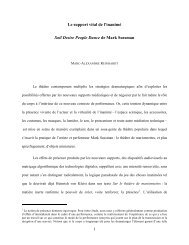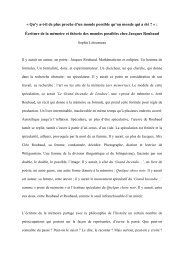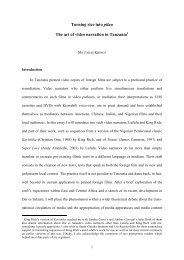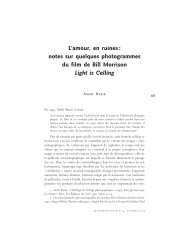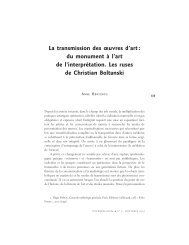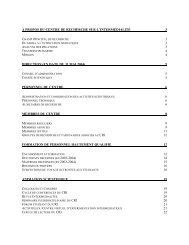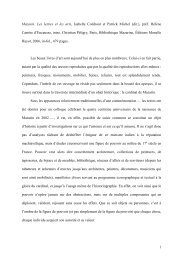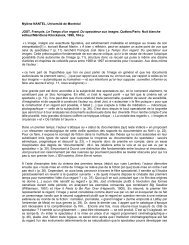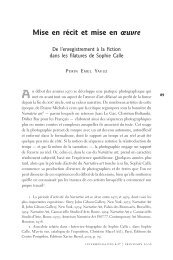Intermediality - Centre de recherche sur l'intermédialité (CRI ...
Intermediality - Centre de recherche sur l'intermédialité (CRI ...
Intermediality - Centre de recherche sur l'intermédialité (CRI ...
You also want an ePaper? Increase the reach of your titles
YUMPU automatically turns print PDFs into web optimized ePapers that Google loves.
intermediality, intertextuality, and remediation<br />
ible, any discussion about intermedial practices in given medial confi gurations<br />
becomes pointless (at least if we do not adopt an exclusively genealogical point<br />
of view). 27 Therefore, in cases like computer generated photography, digital<br />
media seem to be forced to inclu<strong>de</strong> in their (necessary) simulation processes<br />
not only the simulation of the other medium’s specifi c qualities, forms and<br />
structures, but also the simulation of a perceptible medial difference, in or<strong>de</strong>r<br />
to create a discernible effect of intermediality. Thus, one could conclu<strong>de</strong>,<br />
digital technology opens up a fi eld of a simulated—of a “virtual”—intermediality<br />
(virtualizing and <strong>de</strong>materializing the “reality” of intermedial cultural<br />
practices), a fi eld that hitherto has been occupied uniquely by digital media. 28<br />
It thus follows that concepts like media combination and intermedial references,<br />
and, ultimately, any conception of intermediality as a category for the<br />
concrete analysis of given medial confi gurations, come up against their own<br />
internal limitations as soon as digital media and their particular—mathematical—simulation<br />
processes are in question (even if these limits can be overcome<br />
by strategies of a “virtual” intermediality). If, however, we take those approaches<br />
to intermediality into account, that adopt a genealogical point of view or concentrate<br />
on general questions of media-recognition, or of how media are or can be<br />
un<strong>de</strong>rstood, a different un<strong>de</strong>rstanding of intermedial relationships comes to the<br />
fore: here, the main focus is not on the specifi c ways in which intermedial practices<br />
are realized in, and take part in the overall signifi cation of a given media<br />
product, but, more generally, on the fundamental interrelatedness of earlier and<br />
newer media. Consequently, <strong>de</strong>parting from this kind of research perspective, the<br />
particular differences between digital and non-digital media are only of relative<br />
importance: even if in certain computer-generated photos a medial difference<br />
should no longer be discernable, and if, therefore, it becomes problematic to<br />
attribute an intermedial quality to the image itself, the same image, from a<br />
27. Cf. on this also Joachim Paech, “Intermedialität <strong>de</strong>s Films,” in Jürgen Felix (ed.),<br />
Mo<strong>de</strong>rne Film Theorie, Mainz, Ben<strong>de</strong>r, 2002, p. 300; Yvonne Spielmann, “Intermedialität<br />
und Hybridisierung,” in Roger Lü<strong>de</strong>ke, Erika Greber (eds.), Intermedium Literatur, p. 78-102.<br />
28. On the fundamental differences between digital and non-digital media, see in<br />
more <strong>de</strong>tail Jens Schröter (“Intermedialität, Medienspezifi k und die universelle Maschine”)<br />
who speaks of a “virtual” intermediality, and Yvonne Spielmann who, in this<br />
context, introduces the i<strong>de</strong>a of a “remediation of intermediality” (“Intermedialität und<br />
Hybridisierung,” p. 91). Taking this one step further, one could conclu<strong>de</strong> that digital<br />
media not only remediate earlier media and their respective representational practices,<br />
but specifi c intermedial relationships between these earlier media as well. In short: digital<br />
media remediate remediation practices of earlier media, they remediate remediation.<br />
63


